Access to land: resources database
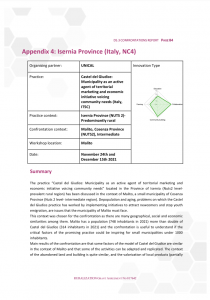
D5.3 Lessons learned from confrontations – Appendix 4: Cosenza Province (Italy, NC4)
Section title: Appendix 4: Cosenza Province (Italy, NC4)
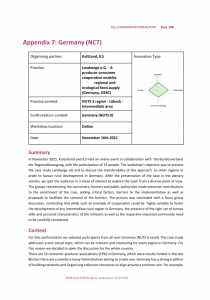
D5.3 Lessons learned from confrontations – Appendix 7: Germany (NC7)
Section title: Appendix 7: Germany (NC7)

D5.3 Lessons learned from confrontations – Confrontation Report – CNRS Team Toulouse Metropolis (NUTS3 – Midi-Pyrénée) and Versailles Plain (FR5A)
Section title: D5.3 Confrontation Report – CNRS Team Toulouse Metropolis (NUTS3 – Midi-Pyrénée) and Versailles Plain (FR5A)
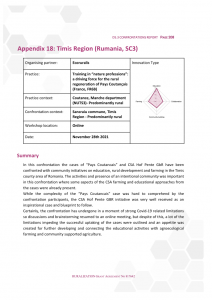
D5.3 Lessons learned from confrontations – Confrontation Report NE1 Farma Martynika
Section title: Confrontation Report NE1 Farma Martynika: an ecotouristic and educational farm showing that changingfrom urban to rural life is difficult butpossible.
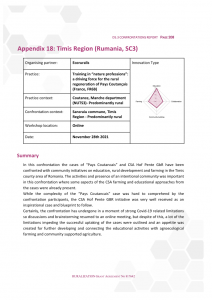
D5.3 Lessons learned from confrontations – Confrontation Report SC3 Training in “nature professions”
Section title: Confrontation Report SC3 Training in “nature professions”: a drivingforce for the rural regeneration of “Pays Coutancais” & CSA Hof Pente GbR – Success through community, education and ecology.
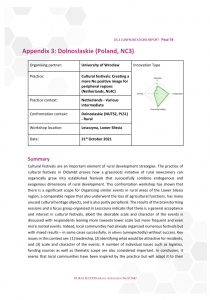
D5.3 Lessons learned from confrontations – Dolnoslaskie (NUTS 2)
Section title: Dolnoslaskie (NUTS 2)
Highlights: A general lesson learned within the confrontation process is that repeating the success of the cultural festivals in Oldambt will probably depend mostly on creating possibilities for organic development of similar initiatives in other places (such as Lower Silesia). It is very challenging for most areas in Lower Silesia with their current resources to skip the early points of development and try to start already from the point where Oldambt festivals are now, i.e. after more than a decade of functioning. The attention of policymakers should be therefore focused more on earlier steps of the process, i.e. creating opportunities for similar process to occur in other areas – organic development from smaller initiatives led mostly by motivated newcomers to larger festivals organized in cooperation with local authorities. In this way, the promising practice will not only bring the benefits that cultural festivals provide, but also improve community integration within the process of establishing the practice itself.
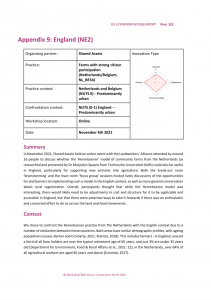
D5.3 Lessons learned from confrontations – England ( NUTS 0/1) (Confrontation report: NE2 – Community owned farms)
Section title: England ( NUTS 0/1) (Confrontation report: NE2 – Community owned farms)
Highlights: In November 2021, Shared Assets held an online event with the Landworkers’ Alliance attended by around 16 people to discuss whether the ‘Herenboeren’ model of community farms from the Netherlands (as researched and presented by Dr Marjolein Spaans from Technische Universiteit Delft) could also be useful in England, particularly for supporting new entrants into agriculture. Both the break-out room ‘brainstorming’ and the main room ‘focus group’ sessions hosted lively discussions of the opportunities for and barriers to implementing such a model in the English context, as well as more general conversation about rural regeneration. Overall, participants thought that while the Herenboeren model was interesting, there would likely need to be adjustments in cost and structure for it to be applicable and accessible in England, but that there were potential ways to take it forwards if there was an enthusiastic and concerted effort to do so across the land and food movements.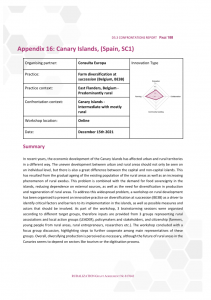
D5.3 Lessons learned from confrontations – Farm diversification at succession
Section title: Farm diversification at succession
Sub-section/paragraph: T5.3 Confrontation report SC1
Highlights: The future of the primary sector is cross-sectoral There are many sectors that are interlinked with and add value to the primary sector, such as tourism. When it comes to businesses whose main source of income is agricultural production, diversification of production is often not enough to make it profitable. However, looking at non-agricultural activities that add value to the business can provide a radical change. Some options are related to experiential tourism (guided tours), outdoor activities (trekking, star gazing, etc.), rural accommodation, gastronomy (tastings and explanations of winemaking processes), art and culture (exhibitions, live music, theatre performances, etc.).
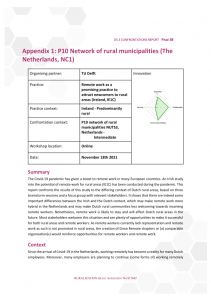
D5.3 Lessons learned from confrontations – P10/local Dutch municipalities
Section title: P10/local Dutch municipalities
Highlights: 1) Grow Remote chapters or (a) comparable organisation(s) could settle in the Netherlands. 2) (Digital) infrastructure improvements and the building of more houses in rural areas to accommodate more inhabitants and remote workers should be supported. 3) The general level of services in rural areas should be improved. 4) Local citizens should be empowered to cooperate in the accomodation of remote workers and in developing a strategy for the probable increase of remote work. 5) The developments of remote work and the opportunities for remote workers in the countryside should continiously be monitored.
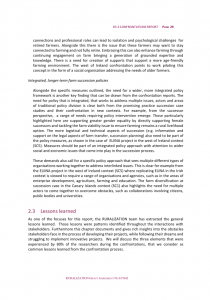
D5.3 Lessons learned from confrontations – Results: Lessons learned
Section title: Section 2: Results
Sub-section/paragraph: “2.3 Lessons learned”
Highlights: As one of the focuses for this report, the RURALIZATION team has extracted the general lessons learned. Those lessons were patterns identified throughout the interactions with stakeholders. Furthermore this chapter documents and gives rich insights into the obstacles stakeholders face in the process of developing their projects, while following their dreams and struggling to implement innovative projects.
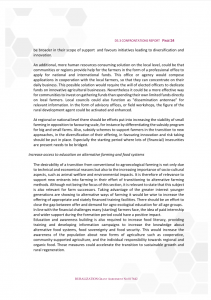
D5.3 Lessons learned from confrontations – The latent innovation potential of farm successors
Section title: Section 2: Results
Sub-section/paragraph: 2.2 The latent innovation potential of farm successors
Highlights: This section describes the main barriers limiting the innovative capacity of farm successors.
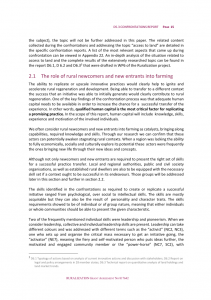
D5.3 Lessons learned from confrontations – The role of rural newcomers and new entrants into farming
Section title: Section 2
Sub-section/paragraph: “2.1 The role of rural newcomers and new entrants into farming”
Highlights: The section describes the role of newcomers and new entrants as perceived by participants of the confrontation workshops
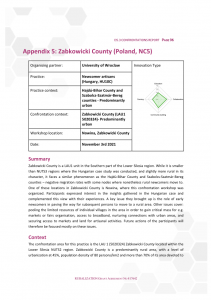
D5.3 Lessons learned from confrontations – Zabkowicki County (LAU1 5020324)
Section title: Zabkowicki County (LAU1 5020324)
Highlights: Generally, even in areas with negative migration rates there can be nonetheless nodes that concentrate newcomers to the area, as is the case in Nowina. Such newcomers that intend to engage in artisanal work face numerous barriers, and local authorities do possess tools to respond to most of them. It is especially important to provide support for early newcomers, who can then use their experiences to guide subsequent immigrants, and also to support newcomers at early stages after they come to the new place, since this is when the support is needed most.
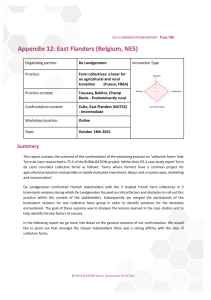
D5.3 Lessons learned from confrontations – Zulte, East Flanders (NUTS3)-3. Intermediate area
Section title: Zulte, East Flanders (NUTS3)-3. Intermediate area
Sub-section/paragraph: Collective Farms: A lever for an agricultural transition?’
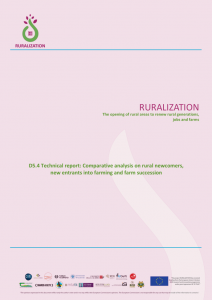
D5.4 Comparative analysis Output #1
Section title: 4. Comparative analysis of confrontations.
